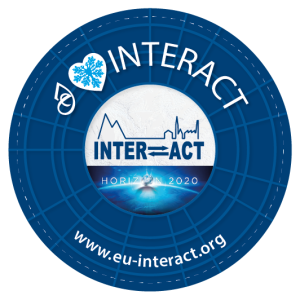INTERACT TA User Community: Current ArcticDefinitions of the Arctic vary according to environmental, geographical, political, cultural and scientific perspectives. Some scientists define the Arctic as areas having a high latitude, long winters, short, cool summers,... More research addressing global challenges of the future
Tue 29th March at 9.30-13.00 CEST
Join the INTERACT TA Community meeting to hear about the state-of-the-art in ArcticDefinitions of the Arctic vary according to environmental, geographical, political, cultural and scientific perspectives. Some scientists define the Arctic as areas having a high latitude, long winters, short, cool summers,... More research supported by INTERACT Transnational Access, how INTERACT is responding to the current societal and geopolitical challenges, and about the possibilities for networking, collaboration and synthesis for the future!
The meeting takes place during the ASSW2022 and it will be in a hybrid format with options for in-person and on-line attendance. On-line participation is free of charge.
Register at https://www.assw.info/registration to attend the meeting (choose “Business Meetings“ on 29th March). Registered on-line participants will receive a link to join the meeting via email from the ASSW 2022 organizers in the morning of day the session takes place.
Programme
09:30-09:45 INTERACT Transnational Access: the past, the present, and the future (Hannele Savela, Thule Institute, University of Oulu)
09:45-11:30 Highlight presentations (chair: Terry Callaghan, University of Sheffield)
09:45-10:00 High tech exploration of water flow inside glaciers (Maarja Kruusmaa, Tallinn University of Technology)
10:00-10:15 BiodiversityBiological diversity. The many and varied forms of life on Earth (collectively known as biota). As well as diversity of species (species diversity), there is also diversity within populations of a... More changes and microplastics on ArcticDefinitions of the Arctic vary according to environmental, geographical, political, cultural and scientific perspectives. Some scientists define the Arctic as areas having a high latitude, long winters, short, cool summers,... More beaches (Cath Waller, University of Hull)
10:15-10:30 Fragile permafrostPermafrost is frozen ground that remains at or below zero degrees Celsius (32 degrees Fahrenheit) for two or more years. It forms in regions where the mean annual temperature is... More ecosystems in Siberian lowland tundraA type of ecosystem in which tree growth is limited by low temperatures. The origin of the word is from from the Kildin Sami word t?ndâr, meaning "uplands" or "treeless mountain tract". In the northern... More (Monique Heijmans, Wageningen University & Research)
10:30-11:00 Coffee break
11:00-11:15 Ensuring tourism and ArcticDefinitions of the Arctic vary according to environmental, geographical, political, cultural and scientific perspectives. Some scientists define the Arctic as areas having a high latitude, long winters, short, cool summers,... More Peoples cooperate for mutual benefit (Niklas Labba, JNL Sámi Consultant)
11:15-11:30 Melting of ArcticDefinitions of the Arctic vary according to environmental, geographical, political, cultural and scientific perspectives. Some scientists define the Arctic as areas having a high latitude, long winters, short, cool summers,... More glaciers and ice gaps and its impact on sea level (Bert Wouters, Delft University of Technology and Utrecht University)
11:30-11:50 Opportunities for networking (Margareta Johansson, Lund University)
11:50-12:10 Opportunities for synthesis (Terry Callaghan, University of Sheffield)
12:10-12:50 Synthesis Forum (chair: Terry Callaghan, University of Sheffield)
12:50-13:00 Conclusions and next steps (chair: Terry Callaghan, University of Sheffield)

